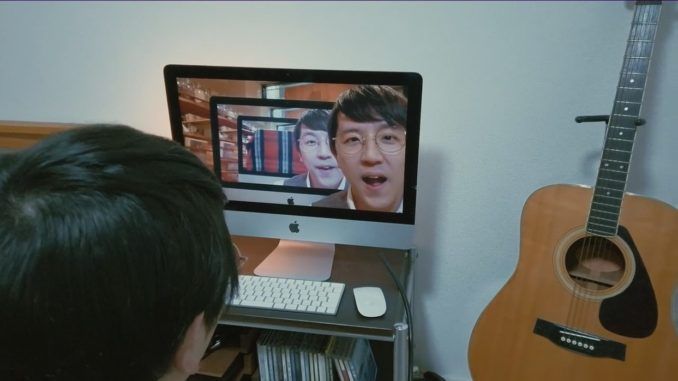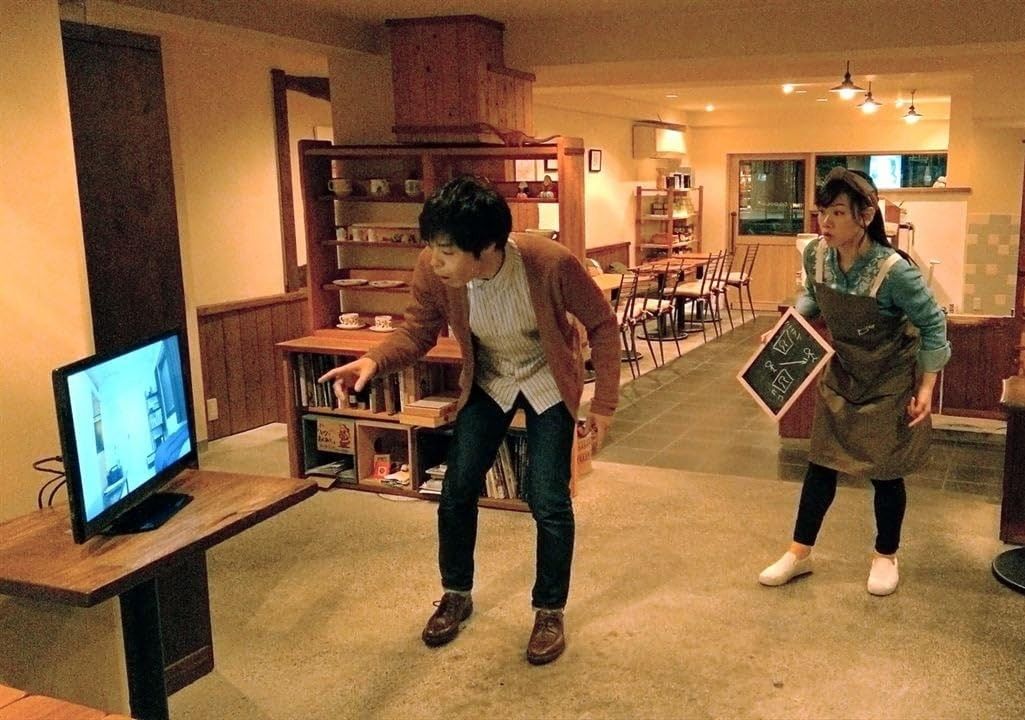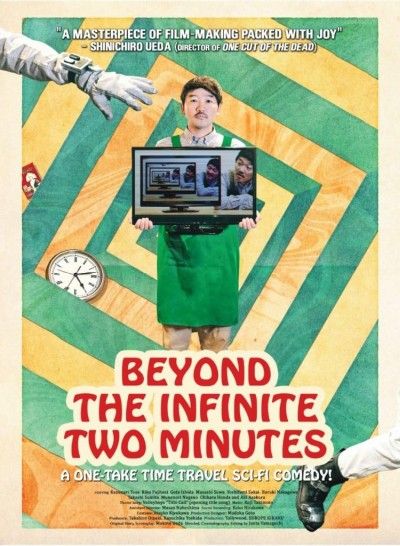
One Cut of the Dead has a lot to answer for. But I mean that in a good way. Following in the wake of its incredible success – the film earned over a thousand times its budget – Japan saw a slew if movies which adopted the same low-cost approach, in particular either being filmed in one take, or giving that appearance. There’s even a name for the genre: nagamawashi, the Japanese term for a long, single shot. The best adopter of the technique is Junta Yamaguchi, whose debut, Beyond the Infinite Two Minutes, is arguably a more impressive bit of technical wizardry. Born in 1987, Yamaguchi actually studied management at university, but as a teenager also became part of the Europe Kikaku theatre troupe, becoming a director there.
Time is equal to all of us, time really transcends borders and is a shared thing, so we can directly speak to the world. — Junta Yamaguchi
What both films share, is a message about how much it matters to live in the here and now, rather than worrying about a future which may or may not happen. Said the director, “It’s really important that we value the present moment. Because if we look too far into the future, it can define what we do in the present, if we try to fulfill whatever destiny the future tells us.” In both limited resources and topic, his work is similar to, yet stands in contrast to, Primer. While no less rigourous, Yamaguchi is more concerned with the human impact than the technical aspects. I find that much more interesting.
For to me, the best movies which play with the fourth dimension are those which have an emotional hook, like Run Lola Run. They can then engage both the brain and the heart, rather than being cold exercises in temporal manipulation. Christopher Nolan films like Memento or Tenet tend to fall into the latter category: exquisitely constructed from a mechanical and analytic point of view. You just wouldn’t want to live there. It’s not an issue with these two features made by Yamaguchi, which are warm, and often very funny. Let’s do a bit of a mind flip and get into the time slip… [Also of note: while not directed by Yamaguchi, the writer of both films, Makoto Ueda, also did the script for Summer Time Machine Blues. No prizes for guessing its topic…]

Beyond the Infinite Two Minutes (2020)
Rating: A-
Dir: Junta Yamaguchi
Star: Kazunari Tosa, Riko Fujitani, Gôta Ishida, Masashi Suwa
In terms of genres, this may cross off more boxes than any other film this year. It’s mostly science fiction, while it is funny enough to qualify as a comedy too. Yet it’s also a thriller, and there’s a romantic element which is key to proceedings as well. Given the minute budget, it’s an amazing technical feat of scripting, production and editing, designed to look like a seamless one-shot (it’s really several, each about ten minutes). But it never forgets that in cinema, everything starts and ends with the characters. You care about the ones here, and what happens to them, as they try to handle a set of circumstances best described as unique, unfolding in real time over little more than an hour.
Kato (Tosa) lives in an apartment above the cafe he owns, though his real ambition is to become a musician. One evening, he suddenly sees himself appearing on his own TV screen, from the monitor in the cafe below, trying to attract his own attention. Courtesy of a wormhole, a portal in space-time has opened, showing him what’s happening below, two minutes into the future. He obeys his own instructions, rushing downstairs to become the other side of the unexpected conversation. Naturally, waitress Aya (Fujitani) is confused, until Kato explains the scenario. Other friends show up, and seek ways to profit from the wormhole, also finding a way the two minutes can be stretched further, by pointing the screens at each other.
 Things naturally go awry, although it’s best not to know exactly how. I will say, the romance kicks in when Future Kato tells Present Kato to ask out a neighbour on whom he has a crush, saying she accepts. Except… she didn’t, Future Kato only saying that to avoid a paradox. It’s a beautiful example of how the film handles the issues “time travel” raises. It adopts a similar approach to One Cut of the Dead, in that you see events twice, the second time from a totally different perspective. Except, here, it happens every two minutes, a startling and ambitious feat, its execution likely helped by the strong theatre background of cast and director.
Things naturally go awry, although it’s best not to know exactly how. I will say, the romance kicks in when Future Kato tells Present Kato to ask out a neighbour on whom he has a crush, saying she accepts. Except… she didn’t, Future Kato only saying that to avoid a paradox. It’s a beautiful example of how the film handles the issues “time travel” raises. It adopts a similar approach to One Cut of the Dead, in that you see events twice, the second time from a totally different perspective. Except, here, it happens every two minutes, a startling and ambitious feat, its execution likely helped by the strong theatre background of cast and director.
It is marginally contrived in some ways. I must say, Japanese monitors have really long power cords. I can’t rearrange my desk before something has to be unplugged. Kato can relocate from his bedroom, down two flights of stairs and into the cafe, without so much as an extension cord. But this is engrossing enough to pull me past such trivial concerns, towards a finale where everything, everywhere, all at once, comes together beautifully. This might not quite replace Run Lola Run as my favourite in the time genre. Tosa’s performance is more laid back than I feel the bizarre circumstances demand, and I prefer the force of nature that is Franka Potente (plus, that soundtrack!). However, I’m hard pushed to think of any other to beat it.

River (2023)
Rating: B
Dir: Junta Yamaguchi
Star: Riko Fujitani, Manami Honjô, Gôta Ishida, Yûki Torigoe
Following up on the wonders of Beyond the Infinite Two Minutes, Yamaguchi goes back to the fun-sized time travel well, once again. Although the results aren’t quite as effective, meandering off-track more than I wanted, it still does a lot with a little. The location here is a mountain inn, where the staff and residents find themselves stuck in a time loop. Every two minutes, they reset to where they were previously, although they retain the memories and experiences of the previous cycle. Hotel maid Mikoto (Fujitani) suspects she might be responsible, having been praying to the river god to stop time, due to a situation unfolding with her crush, Taku (Torigoe), and his impending departure.
This is probably the least interesting of the many threads present. That’s what I mean about the film meandering off track, since the later stages are more concerned about Mikoto’s romantic entanglement. It then causes the eventual resolution to appear suddenly, like a rabbit pulled out of a hat. I’d rather have heard more about that, and less of the lovey-dovey stuff. However, there’s still a lot to enjoy here, particularly in the early stages, with Mikoto and the other staff trying to come to terms with what’s happening. What’s fascinating – and particularly Japanese – is that they remain thoroughly committed to providing excellent customer service to their guests. I can’t quite imagine this happening under similar circumstances at your typical Motel 6.
 Indeed, there’s also something Japanese, about the way most people accept the scenario and adjust accordingly, rolling up their sleeves and getting on with it. This might mean trying to find the scope of the problem, locate the cause, or take care of those who are struggling with the situation. I suspect a Western version would add considerably more conflict. This has a generally more optimistic bent, even treating the topics of suicide and death with a relatively light touch. Depth is provided by the different ways in which the visitors and employees react to the situation. For example, there’s a writer with creative block, who is overjoyed to be stuck in the loop, since it’s a perfect way to avoid having to meet his looming deadline.
Indeed, there’s also something Japanese, about the way most people accept the scenario and adjust accordingly, rolling up their sleeves and getting on with it. This might mean trying to find the scope of the problem, locate the cause, or take care of those who are struggling with the situation. I suspect a Western version would add considerably more conflict. This has a generally more optimistic bent, even treating the topics of suicide and death with a relatively light touch. Depth is provided by the different ways in which the visitors and employees react to the situation. For example, there’s a writer with creative block, who is overjoyed to be stuck in the loop, since it’s a perfect way to avoid having to meet his looming deadline.
Compared to Two Minutes, it’s more technically restrained. While each cycle takes place in a single shot, it is a much more manageable two minutes, rather than having to sustain the illusion for seventy. Nor is there any need to show people having conversations with themselves. I did notice inconsistency with the weather: some cycles start with snow, others don’t. It’s easy to forgive such things, because Yamaguchi has again created, along with writer Makoto Ueda, an engaging work, which manages to be intelligent and heartwarming. The resolution (top) may remind you of a certain, long-running British television series. Other aspects could do too, feeling like one of the “side quest” episodes from said show, back when it was good. There are an awful lot worse things to resemble.
